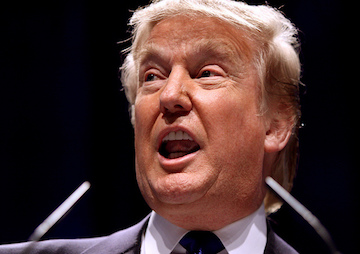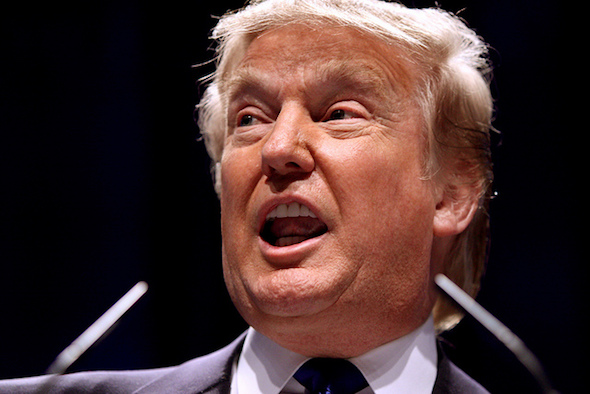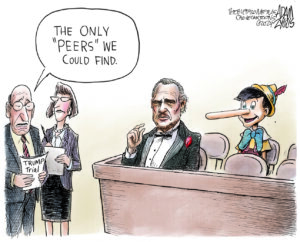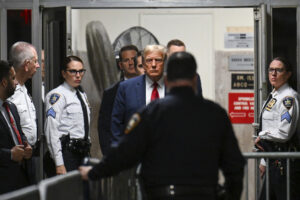Donald Trump and the GOP’s Jurassic Park
The presumptive Republican presidential nominee thinks Americans want to embrace a strongman who shoves aside the niceties of constitutional government. But mass disapproval of Trump's response to the Orlando, Fla., shooting rampage shows he's wrong.

Donald Trump. (Gage Skidmore / CC BY-SA 2.0)
WASHINGTON — The American people know extremism when they see it.
This is very unfortunate for Donald Trump. And it is a nightmare for Republican leaders who see more clearly every day how his candidacy has become a trap: They desperately want to free themselves from the moral wreckage Trump leaves behind but are stuck with a nominee who speaks for a majority of their rank-and-file.
Those who lack confidence in the public’s ability to make rational judgments often argue that horrendous acts — of terrorism, for example — will shake the majority from its commitment to civil liberties, pluralism and tolerance. This view reflects a profound mistrust of the good sense and ethical discernment of the average citizen.
The paradox is that Trump, who claims to speak for the people, shares this very low opinion of who Americans are. In responding to the Orlando massacre, he broadened his call for a ban on Muslim immigration, suggested that American Muslims are holding back information about potential terrorists, and darkly implied that President Obama has secret motives when it comes to Islam.
Trump thinks that Americans want to embrace a strongman who shoves aside the niceties of constitutional government. The problem for Trump and the good news about our nation is that he’s wrong. The problem for GOP leaders is that supporters of their party are outliers from the rest of their fellow citizens: They side with Trump.
This was brought home by two polls released on Wednesday. A CBS News survey taken June 13-14 found that 62 percent of Americans rejected a temporary ban on Muslims immigrating to the United States; only 31 percent supported it. But where Democrats opposed the ban by more than 5-to-1 and independents rejected it by 2-to-1, Republicans favored it, 56 percent to 37 percent.
Asked more generally about Trump’s response to the Orlando attacks, Americans disapproved, 51 percent to 25 percent. But again, Republicans were the outliers: They approved of Trump’s response by a margin of about 2-to-1. Not surprisingly, Democrats overwhelmingly disapproved of Trump’s post-Orlando reaction, but independents did so as well, by a margin of 5-to-2.
Most worrisome for Republicans politically, more independents disapproved of Trump’s response to Orlando (51 percent) than of Hillary Clinton’s (36 percent).
And a new Washington Post/ABC News poll found that 70 percent of Americans viewed Trump unfavorably, up 10 points from a month earlier. Yet if this tempts GOP leaders to try to dump Trump, they confront the sobering reality that among Republicans, 65 percent still rate him favorably.
Thus are party leaders, most prominently House Speaker Paul Ryan, mired in an untenable position. Ryan went out of his way to disassociate himself from Trump’s terrorism comments, yet he refuses to rescind his endorsement of the man who has won a majority of Republican National Convention delegates.
But if Trump’s take is as irresponsible as Ryan says it is, how can a responsible politician possibly want such an extremist to become our commander in chief? The answer is obvious: If Ryan and others like him tried to block Trump, they would enrage half to two-thirds of their own partisans.
It fell to Obama on Tuesday to show how Republicans have long flirted with a rhetoric of mistrust and fear that Trump has now taken to its logical, if chilling, conclusion. He noted the GOP has long said, as Trump is insisting, that “we can’t beat ISIL unless we call them ‘radical Islamists.'”
“What exactly would using this label accomplish?” Obama asked. “What exactly would it change? Would it make ISIL less committed to trying to kill Americans?” He concluded: “There’s no magic to the phrase ‘radical Islam.’ It’s a political talking point; it’s not a strategy.”
The president was noticing what the social scientists Seymour Martin Lipset and Earl Raab observed in their classic book “The Politics of Unreason.” Right-wing extremists, they wrote, have always highlighted “the magical power of the word” and the faith that “just saying the right thing, believing the right thing, is the substance of victory and remedy.”
Throughout the Obama presidency, Republicans have played at the edges of extremist politics hoping to mollify the red hots in their following. But after many years of magical thinking from their leaders, the faithful decided they wanted to bring on the wizard himself who really seemed to believe the incantations.
By animating the anxieties and conspiracy theories of the ultra-right, GOP leaders turned their party into Jurassic Park: They can no longer control what they created.
E.J. Dionne’s email address is [email protected]. Twitter: @EJDionne.
© 2016, Washington Post Writers Group
Your support matters…Independent journalism is under threat and overshadowed by heavily funded mainstream media.
You can help level the playing field. Become a member.
Your tax-deductible contribution keeps us digging beneath the headlines to give you thought-provoking, investigative reporting and analysis that unearths what's really happening- without compromise.
Give today to support our courageous, independent journalists.






You need to be a supporter to comment.
There are currently no responses to this article.
Be the first to respond.